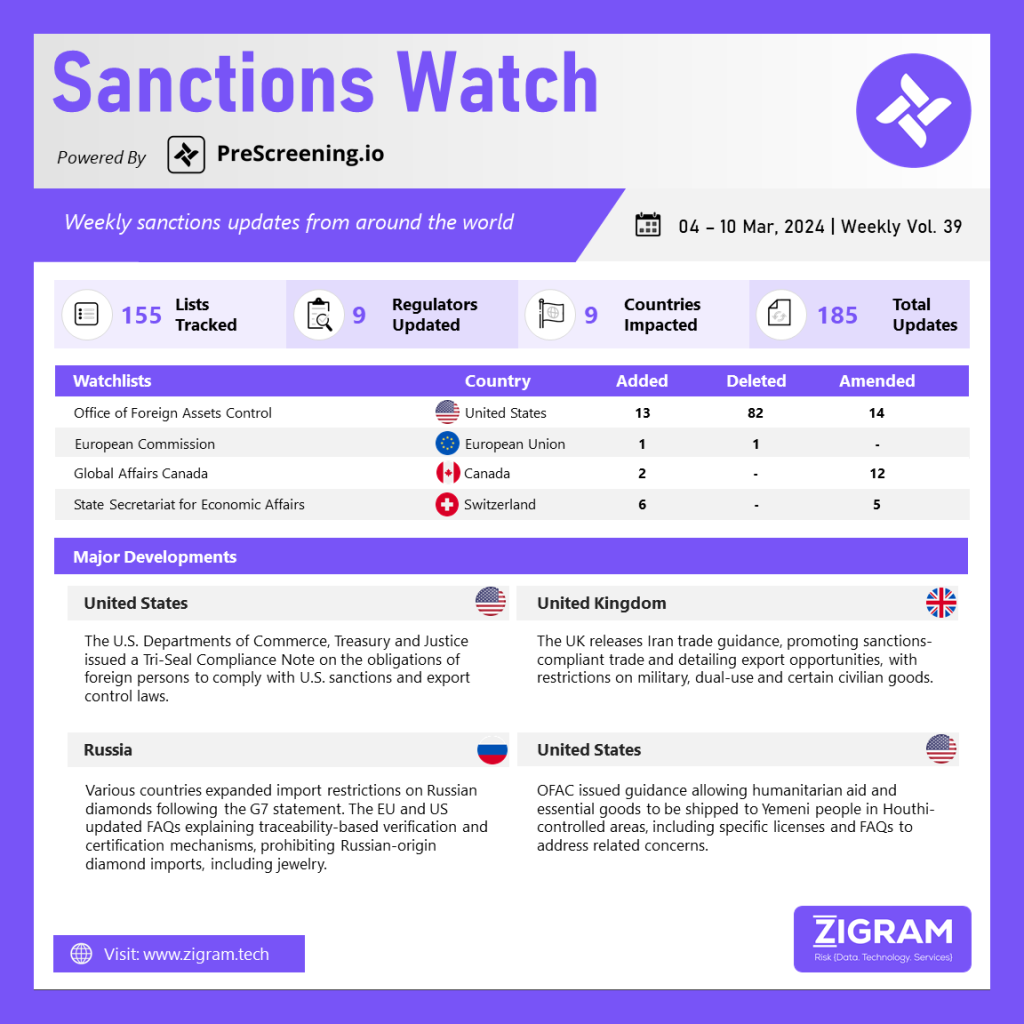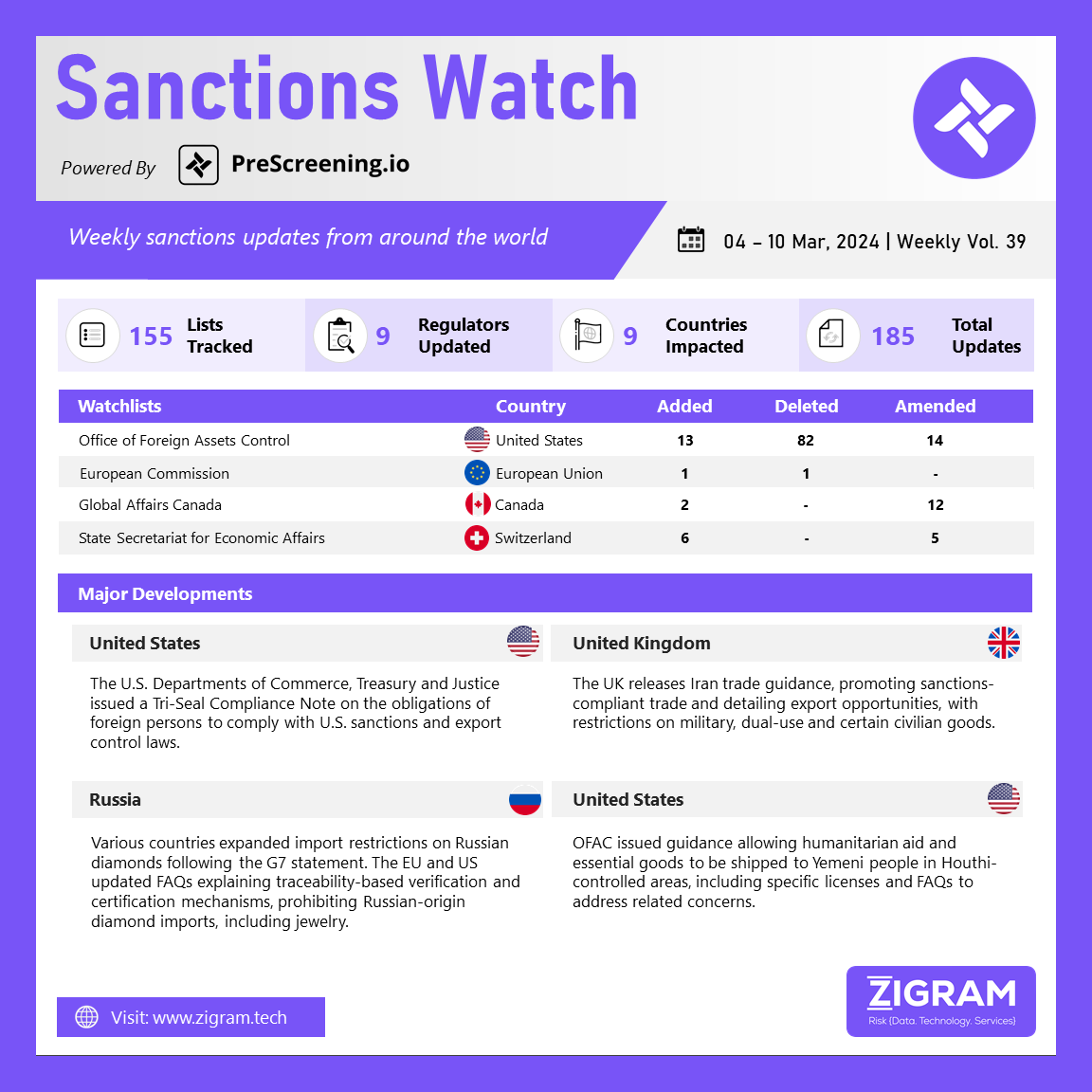Published Date:
In the latest edition of our Sanctions Watch weekly digest, we present significant updates on sanction watchlists and regulatory developments.
On March 6, 2024, the U.S. Departments of Commerce, Treasury and Justice jointly released a Tri-Seal Compliance Note (“Note”) detailing the responsibilities of foreign companies and individuals in adhering to U.S. sanctions and export control laws. The Note offers a concise summary of how U.S. sanctions and export controls apply to foreign entities, illustrating with instances of civil and criminal enforcement actions taken against foreign entities for suspected violations. Additionally, the Note emphasizes key compliance factors that foreign entities should bear in mind when engaging in activities that fall under U.S. jurisdiction.
The United Kingdom has recently issued guidance on trading with Iran, emphasizing the importance of adhering to sanctions while conducting business with the country. The guidance provides an overview of Iran’s export landscape and highlights potential business opportunities for UK enterprises in Iran. It also outlines various trade restrictions that UK businesses must consider when dealing with Iran. These restrictions include limitations on the export of military goods and technology, dual-use items, goods that could potentially be utilized to suppress civilians or intercept communications, nuclear and missile-related items, graphite, relevant metals and enterprise resource planning software. The guidance aims to assist UK businesses in navigating the complexities of trading with Iran in a manner that complies with international sanctions regulations.
On March 1, 2024, several countries, including the EU, UK, US, Japan, Canada and Switzerland, expanded their import restrictions on Russian diamonds following a G7 statement from the previous year. The EU updated its FAQs to detail a traceability-based verification and certification mechanism for rough diamonds, evidential requirements for importers, the link with Kimberley Process certification and an optional certification mechanism effective from March 1, 2024, to August 31, 2024. Similarly, the US updated its FAQs, clarifying that the Diamond Jewelry Determination now bans the import of diamond jewelry and unsorted diamonds of Russian origin, including items originally exported from Russia, such as a diamond bracelet made in the Russian Federation, regardless of the diamonds’ origin.
The Office of Foreign Assets Control has issued guidance regarding the provision of humanitarian aid and critical goods to the Yemeni people. The guidance clarifies that shipping commercial goods to ports and airports in Houthi-controlled areas, including related transactions like port fees, is not prohibited. There are six general licenses specifically addressing the flow of humanitarian aid and critical goods to Yemen. The guidance also includes prohibitions and relevant licenses related to NGO activities, agricultural commodities and medicine, which are pertinent to Yemen. Additionally, there are FAQs that explain permissible activities and the effects of designating the Houthis.
- #UnitedStates
- #ComplianceNote
- #ExportControlLaws
- #UnitedKingdom
- #Iran
- #TradeRestrictions
- #Japan
- #Canada
- #Switzerland
- #G7
- #SanctionsWatch
- #RegulatoryCompliance
- #TradeCompliance
- #SanctionsEnforcement
- #SanctionsMonitoringBoard
- #RegulatoryObligations
- #SanctionsBreaches
- #Compliance
- #FAQ
- #OFAC
- #Yemen
- #Houthi


